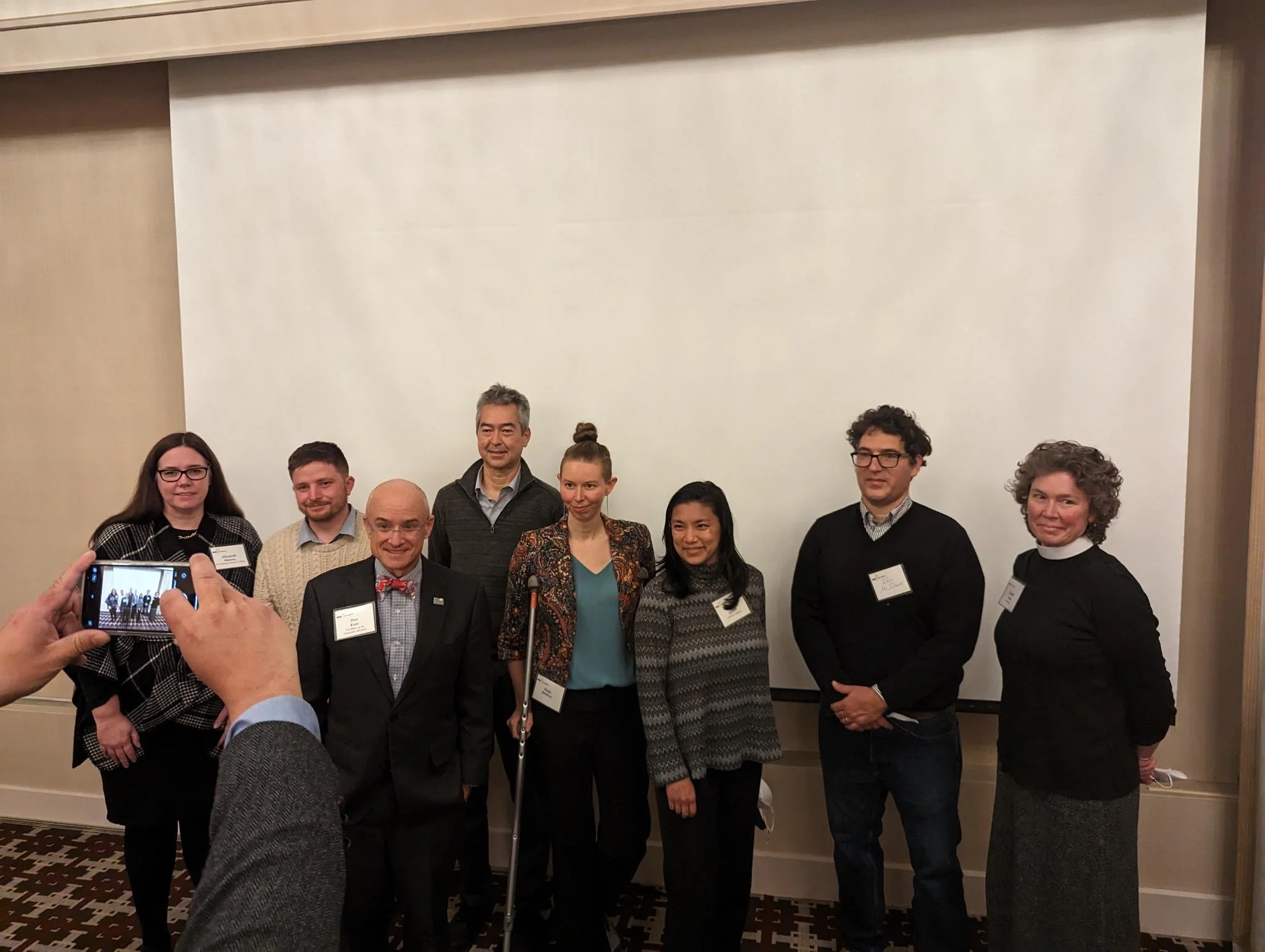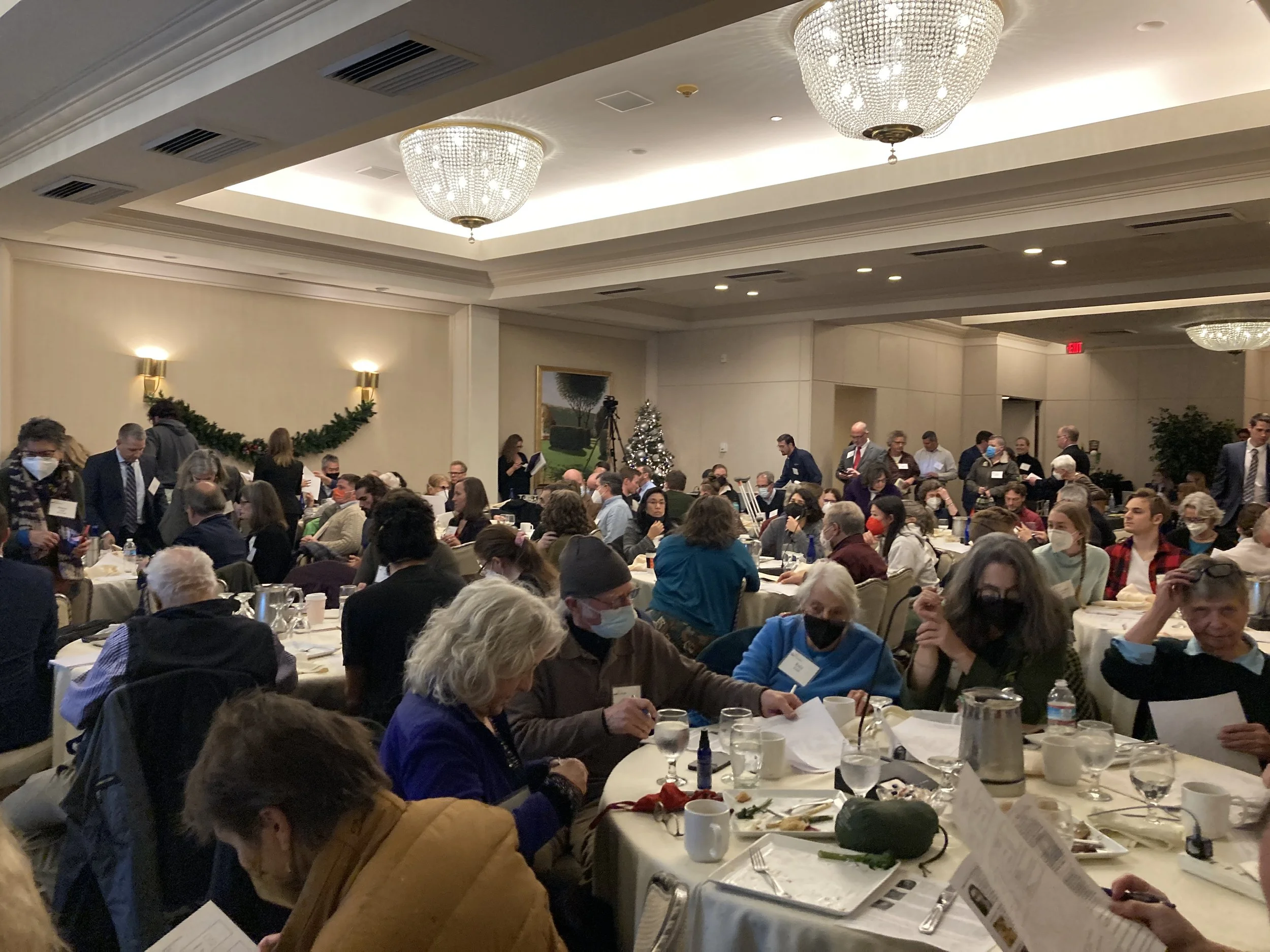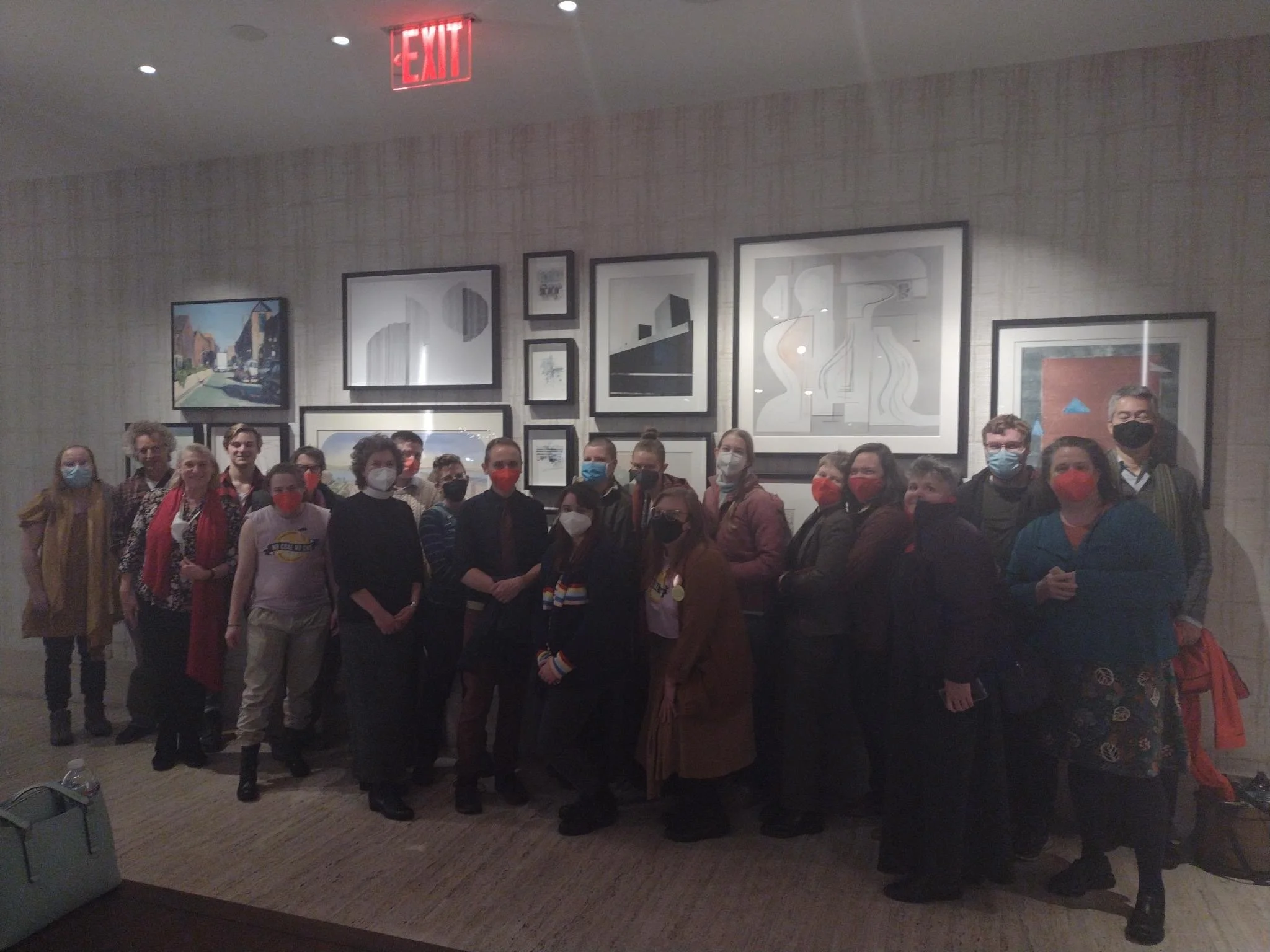Newly elected members of the Consumer Liaison Group Coordinating Committee - Elizabeth Mahony, Jacob Powsner, Don Kreis, Nathan Phillips, Sonja Birthisel, Regine Spector, Ian McDonald, and Kendra Ford
No Coal No Gas Activists Pack the room at ISO-NE’s Consumer Liaison Group meeting.
BOSTON, MASSACHUSETTS - On Wednesday, No Coal No Gas activists elected a slate of climate activists and allies to the Coordinating Committee of the Consumer Liaison Group (CLGCC) of the regional grid operator, ISO New England (ISO-NE). The result of the election effectively remove fossil fuel interests from leadership of the CLG, which is a forum for the exchange of information between ISO-NE and electricity ratepayers in the region. A record number of attendees were present in-person and online to vote for grassroots climate justice activists, ratepayer advocates as well as representatives from an environmental policy nonprofit organization and an energy advisory company whose work supports businesses to meet their sustainability goals.
The Consumer Liaison Group (CLG) is organized by ISO-NE to facilitate interaction between ISO and regional electricity consumers. Meetings are open to the public and usually include panel discussions, presentations from ISO, and remarks from guest speakers on topics related to the region’s energy grid. Despite its liaison role, CLG has not been a particularly welcoming space for the average energy consumer – beginning with the fact that most people do not know it exists. No Coal No Gas activists plan to make space within CLG for frontline communities and residential ratepayers to have a say in regional energy processes.
“ISO New England is also an ecosystem,” said Nathan Phillips (he/they), a Boston University professor who was elected to the CLG board as a ratepayer from Massachusetts. “I want to elevate what we’re calling ‘consumers’ in this ecosystem to have full ecological agency to reform the grid to one that’s transparent, democratic and just. ISO-New England is currently organized as an exclusive country club with rules to protect incumbents, exclude innovators, and maintain the status quo. Yet swift and just change is what today’s and future generations demand.”
In a first for a CLG meeting, the large crowd of residential ratepayers outnumbered corporate interests. As a result, questions for keynote speakers made it clear that New Englanders believe that just and reasonable electrical rates are defined by more than the cost per kilowatt hour. Questioners pointed to the full cost of existing energy markets, and they made it clear that they expect ISO-NE to do a lot more to facilitate a just transition to renewable energy.
Crowded room full of No Coal No Gas activists voting for the new CLGCC.
FERC Commissioner Danley, and ISO-NE Board Chair Cheryl LaFleur both delivered keynote addresses and took questions from the attendees. Commissioner Danley was frustratingly ambivalent about the transition, claiming to be “agnostic” about state policy while advocating for new natural gas pipeline construction in the region. Danly, who has repeatedly voted against considering greenhouse gas emissions in FERC dockets, also deflected questions about climate change, claiming that FERC has a “narrow mandate.”
ISO Board Chair LaFluer, who is a former FERC Commissioner and past CEO of National Grid, expressed frustration with Danly’s remarks, at one point stating that she knew he was likely to make statements with which she disagreed, but she “didn’t expect him to throw bombs into the room that [she] would have to get up here and diffuse.”
“I think Cheryl LaFleur was working hard to address the people who were actually in the room, responding to the unexpected number of ratepayers in the room and laying aside many of the remarks she had prepared for the few dozen attendees in business suits,” said Marla Marcum with the Climate Disobedience Center. “She signaled in her address that hearing from us is important and tried to convey that she is on our side. I hope she understands that our experience tells us that officials must show their true commitments through actions and not just words. As long as she is the ISO-NE Board Chair, she will be receiving genuine feedback from frustrated ratepayers.”
Over the past three years, No Coal No Gas and other climate organizing groups across the region have put public pressure on ISO-NE to take their role in addressing the climate crisis seriously as part of their mandate to “[keep] electricity flowing across the six New England states and ensuring that the region has reliable, competitively priced wholesale electricity today and into the future.” Yet ISO’s limited interactions with the public and inaccessible processes has left little space for ratepayer participation in decision making. Despite multiple protests and record numbers of comments on ISO-NE’s filings with the Federal Energy Regulatory Commission (FERC), ISO-NE’s resistance to interaction with the general public continues to keep them insulated from collaboration focused on the needs of the ratepayers who fund their entire business.
No Coal No Gas supported the 12 successful candidates for the CLGCC, including a slate of their own members and allies in the climate movement. The new members of the CLGCC (serving a two year term) include six grassroots activists: Reverend Kendra Ford (NH), Dr. Sonja Birthisel (ME), Dr. Nathan Phillips (MA), Dr. Regine Spector (MA), Jacob Powsner (VT), Ian McDonald (CT). NCNG supported six additional nominees who were already serving on the Committee. NCNG endorsed the six other elected members: Hank Webster (RI), Elizabeth Mahony (MA), Donald Kreis (NH), Bill Dornbos (CT), Andrew Landry (ME), and August Fromuth (NH). You can view the NCNG slate with activist bios and the organizational affiliations of the six re-elected incumbents here. As a result of these efforts, two long-time board members were not re-elected. Newly-elected CLGCC members hope that this shift will allow the CLG to be a stronger voice in pushing ISO-NE to prioritize climate justice as one component of advocacy for ratepayers.
“I have worked closely with many agencies which help people who struggle to keep their homes, have enough food, and pay their energy bills. I want those people to have a voice in the halls where decisions are made to be able to heal their lives and their communities by being part of the choices that affect their daily lives,” said Rev. Kendra Ford (she/her), Climate Organizer with the No Coal No Gas campaign, and newly elected CLGCC member. “I have watched our society spin in denial about the ravages of climate change. We can no longer wait for it to be convenient or profitable for the few. We must take bold action on behalf of ordinary ratepayers and all global citizens.”
########
The No Coal No Gas campaign, launched in 2019 with support from the Climate Disobedience Center and 350 New Hampshire Action, set its sights on Merrimack Station upon recognizing that coal is the worst and dirtiest fossil fuel source for electrical generation, and that this power plant is the last of its kind in New England. The campaign’s goals include building community, showing what is possible when we take collective action, and shutting down the coal-fired power plant.
Group of No Coal No Gas activists after the CLGCC Meeting in the Boston hotel
For more information about the campaign to end coal in New England, visit nocoalnogas.org.




